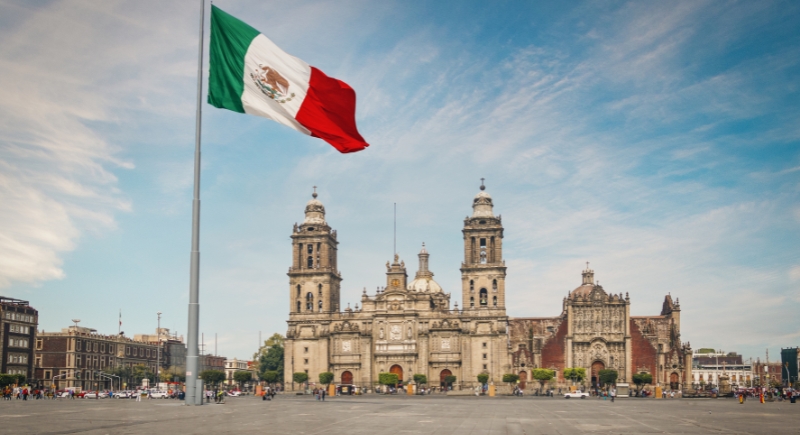Foreign countries collectively hold $8.8 trillion in U.S. government debt. These holdings originate from long-standing trade alliances, global investment strategies, or sovereign wealth management. The reasons vary, but the numbers reflect economic trust and global reliance. Read on as we rank them from lowest to highest.
Germany ($97 Billion)

Credit: Getty Images
Germany, the eurozone's economic powerhouse, maintains a deliberate strategy of fiscal restraint. Its modest U.S. debt holdings reflect long-standing commitments to financial conservatism. Despite significant export activity, Berlin prefers to keep its foreign reserves diversified by only relying on American securities, primarily during periods of regional economic or political turbulence.
Mexico ($103 Billion)

Credit: Getty Images
Mexico is tightly tied to the U.S. through trade and remittances, and uses its Treasuries to buffer against peso volatility and inflation. The United States accounts for over 80% of its exports, so it makes sense to maintain reserves in dollars as a cushion during policy shifts or trade renegotiations across the border.
South Korea ($125 Billion)

Credit: Getty Images
As a global tech exporter, South Korea manages its reserves to support the won and protect trade competitiveness. U.S. debt offers a low-risk solution during global slowdowns. Geopolitical tensions, particularly involving North Korea, also make stable assets like treasuries an essential component of Seoul’s economic risk management strategy.
Saudi Arabia ($138 Billion)

Credit: Scopio
Saudi Arabia’s revenue-rich oil economy funnels excess capital into U.S. securities as part of its broader reserve management. While funding major development goals, such as Vision 2030, at home, the Kingdom also uses Treasuries to anchor its currency and sustain credibility in global markets, which are highly sensitive to energy prices.
Norway ($158 Billion)

Credit: Getty Images
Much of Norway’s foreign investment strategy comes through its sovereign wealth fund, the Government Pension Fund Global. The fund treats U.S. Treasuries as a form of financial ballast. The emphasis is on the long-term preservation of oil-generated wealth, rather than short-term yield hunting.
Brazil ($202 Billion)

Credit: Getty Images
Brazil’s economy is frequently tested by inflation spikes and political shifts. U.S. debt provides it a means to signal fiscal responsibility while offering liquidity. These holdings also help the central bank stabilize and attract international investors who are wary of emerging-market volatility.
Hong Kong ($255 Billion)

Credit: Getty Images
Hong Kong, due to its currency peg with the U.S. dollar, is almost required to maintain large holdings of U.S. assets. The region’s massive financial flows demand dependable reserves. Treasuries also serve as a financial buffer for both public and private sector liquidity.
Taiwan ($282 Billion)

Credit: pexels
Semiconductors drive Taiwan’s economy, and U.S. treasuries protect it. These assets help Taipei stabilize foreign reserves while hedging against risks tied to cross-strait relations. With major revenue tied to tech exports, steady bond investments also insulate the country’s currency from shifts in demand and investor sentiment.
France ($332 Billion)

Credit: Getty Images
France favors strategic reserve diversification, particularly in response to eurozone fragility. American securities provide liquidity when the euro faces stress from political unrest or financial policy divergence. This holding also ensures Paris has access to dollar liquidity in times of strain, even within a predominantly euro-denominated economy.
Canada ($379 Billion)

Credit: Getty Images
Cross-border banking norms between Canada and the U.S. create a natural path for Canadian institutions to favor treasuries. The close trade relationship, similar interest rate patterns, and nearly synchronized financial rules mean that American debt is almost treated like a domestic asset by many Canadian reserve managers.
Cayman Islands ($419 Billion)

Credit: Getty Images
The major stake in U.S. debt is mostly financial smoke and mirrors. The Cayman Islands serve as a go-between for massive hedge funds and corporate structures. The holdings reflect institutional activity booked through the territory, not government policy or national economic interest.
Luxembourg ($424 Billion)

Credit: Sergey Novikov
Luxembourg’s financial sector hosts thousands of investment funds, many with international clients. U.S. treasuries are a favorite tool due to their dependability. These assets pass through Luxembourg’s systems en route to other jurisdictions, meaning that the total is more about global finance logistics than the country’s internal capital.
United Kingdom ($723 Billion)

Credit: pexels
London makes U.S. bonds a natural choice for reserve and trading strategies. Institutions ranging from pension funds to international banks buy treasuries through U.K.-based operations. A deep historical and economic connection with the U.S. underpins this substantial participation in American debt markets.
China ($759 Billion)

Credit: Getty Images
Although China has scaled back from its peak levels, it still uses treasuries to manage the yuan and maintain export competitiveness. As the world’s second-largest economy, it needs these holdings for both monetary policy leverage and global influence. The balance reflects caution amid ongoing trade and geopolitical tensions.
Japan ($1 Trillion+)

Credit: Getty Images
Japan remains the biggest foreign holder of U.S. debt. Aging demographics and a culture of domestic savings mean Japanese institutions often look outward for returns. Treasuries fit that mold perfectly since they are stable and easy to trade.
